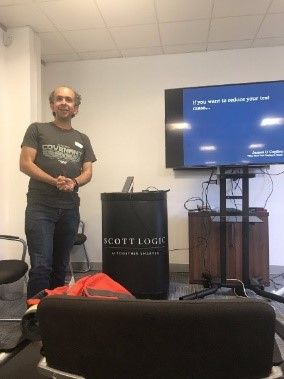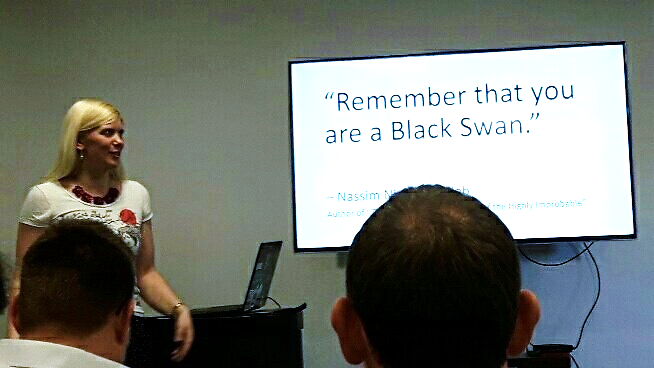
A meetup is very similar to having a chat with friends over a cup of tea with biscuits or beer with pizza, although the latter seems to be the beverage of choice! I first heard of a test meetup when I went to the Assurance Leadership Forum (ALF) with a fellow test enthusiast that I had the pleasure of making the acquaintance of; which was coincidentally at a pub so beer was aplenty. At that point, I didn’t know that there was an organisation also named Meetup! Meetup brings people together in thousands of cities to do more of what they want to do in life. It is organised around one simple idea: when we get together and do the things that matter to us, we’re at our best. And that’s what Meetup does. It brings people together to do, explore, teach and learn the things that help them come alive.

The Software Testing Clinic part of the Ministry of Testing was the next meetup I attended, and I saw them as the “little and often” version of multi-day less regular conferences. The test meetups take different formats, and having attended 3 different ones - I am not biased towards any particular format as I think they all add value if you want to learn, however the more regular meetups tend to create a virtual community which encourages a knowledge sharing and growth in the local test community. Attending meetups is simple and doesn’t pinch your purse! You register for a meetup account, add your location and interests and you are presented with options galore. You go to the homepage of the meetup you are interested in and select ‘Join’, and while some of them need you to answer some profile questions some will add you as a member immediately. Once you are a member, it allows you to join the community and message people in the group, RSVP to the meetup, and see who else is coming etc. The audience at meetups is really a mixed bag, you will find people who attend to feed their curiosity with the craft of test, or those who are the ninjas of test earning the belts of experience. Organising or hosting one, is slightly more complicated, only because most of these are run as voluntary groups with a passionate person driving it to keep it alive, most of whom already have a full time day job. I had the opportunity to host a meetup on behalf of Scott Logic in our Bristol office, collaborating with South West Test (SWT) . Getting in touch with the organisers was easy, getting the speakers aligned with available dates was slightly tricky, with the trickiest part of all being to get speakers’ talks prepared and summarised ready for presentation. As my colleague Rosie Hamilton @Rosicadia explained it takes creativity to conceptualise a good talk and then a bundle of dedication to make it well presented, all done in personal time. In short it shows the passion of the individuals who are willing to give up their personal time for the cause.
There were 3 talks at SWT, 2 lightening talks by Steve Loughran and Kevlin Henney, each lasting 7-10 minutes and a talk by Rosie Hamilton which was about 30 minutes long:
- Lightening talk #1 by Steve Loughran: “Mocking, the enemy of maintenance”
- Lightening talk #2 by Kevlin Henney: “The Rule of Three”
- Talk #3 by Rosie Hamilton - “Discovering Logic in Testing”
Steve Loughran: “Mocking, the enemy of maintenance”
Steve’s talk was about how Mocking can become a maintenance nightmare with code changes in the context of an enterprise application. Heads nodding in different directions, I’m sure this was a topic of discussions during post session networking. He explained how his current work on Hadoop has influenced his opinion of mocking, more on his blog.
Kevlin Henney: “The Rule of Three”

This was a good talk from Kevlin referencing Gerald Weinberg – where he quotes “nothing is more dangerous than an idea, if you only have one!”. If you can’t think of 3 different interpretations, then you haven’t thought enough. A very powerful thinking method transcending SDLC methodologies. Here is the full version of his lightening talk on YouTube. Tweets on this: @DannyDainton @TheTestDoctor
Rosie Hamilton - “Discovering Logic in Testing”

I really enjoyed this talk and I’m not just saying this because Rosie is a fellow Scott Logician! She describes the types of logical reasoning as defined by expert Logicians, and explains how and which ones are more relevant for a tester.
In brief the 3 main types are
- Deductive: conclusion guaranteed
- Inductive: conclusion merely likely
- Abductive: taking your best shot
She then explained how testing is more like the latter where even in the best scenarios our information is incomplete (which reminded me of the talk by @DanAshby @NSTC “How ignorant are we?”)and how we as testers provide explanations to bugs or system behaviour based on the incomplete information we have, continually updating that understanding as we learn and know more about the environment! I particularly liked the summarisation at the end which likened a tester to a Black Swan. I hope she gets selected for the Manchester Test Bash and UK Star conferences! Go Rosie!! Tweets on this: @TheTestDoctor @DannyDainton
Summary
Meetups are a fun and cost effective way to learn. All you need is a test bag with a few interesting topics, pinch of dedication, spoonful of passion and a sprinkling of mentors or speakers to stir up a nice cup of test! And just like tea, not every cup may be to everyone’s taste!


